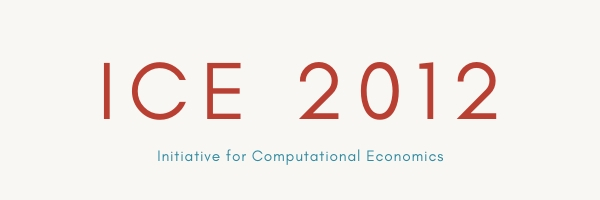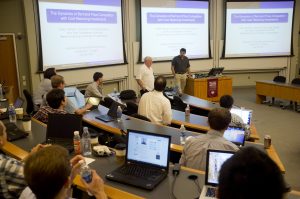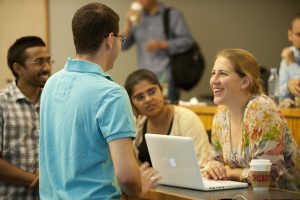
ICE Home Page — Ken Judd’s Home Page
PROGRAM DESCRIPTION
Modern economic theory is producing increasingly realistic and sophisticated models. However, computational challenges have limited their application to empirical analysis and policy evaluation. Instead, economists use ad hoc methods with poorly understood properties that produce approximate solutions of unknown quality. The Initiative for Computational Economics aims to raise the level of computational sophistication in economics by creating an interface between economists and computer scientists. Leading computer scientists and numerical analysts join with leading economists to analyze the computational challenges presented by broad classes of economic models that economists want to apply to data and policy analysis. The institute’s goal is using state-of-the-art numerical methods and computer technology to develop new techniques that address the unique problems posed by modern economic models and their econometric estimation. A standing committee of experts from the University of Chicago and Argonne National Laboratory has assembled leading scholars, promising young scholars and graduate students in economics, computational sciences and applied mathematics to promote the exchange and development of computational research tools as well as fostering a world-wide community in an emerging area of science.
The 2012 Initiative for Computational Economics will bring together a diverse group of academic participants: experts in policy, microeconomics, macroeconomics, model building, estimating and testing, statistical methods, computation, algorithm development, applied mathematics, and numerical analysis for two weeks, July 16-27, 2012. Summer activities will begin with formal morning tutorials on computational topics together with afternoon sessions that will familiarize participants with modern software tools. In the first week, participants will begin work on group computational projects that they will present in the second week. The second week will also include seminar presentations by leading economists featuring recent advances in quantitative economic policy research. Throughout the Institute, there will be numerous opportunities for less formal interactions with lecturers and fellow participants, including a poster session where participants can present their current research. Participants will also be invited to schedule “office hours” with lecturers where they can discuss their research ideas and get feedback from these computational experts.
In general, the program targets young scholars interested in learning new analytical and computational methods and application to their own work, those interested in current findings and applicability to other research, and those with backgrounds in math and computer science who are interested in state of the art applied mathematical tools and their application to substantive policy research.
DETAILS
The 2012 Initiative for Computational Economics will be held at the University of Chicago. In week one, tutorial lectures will be given each morning and on some afternoons. These tutorials will cover topics on numerical methods for optimization, numerical methods for dynamic programming, solution methods for dynamic stochastic general equilibrium models and Nash equilibria of games, numerical methods for structural estimation and simulation methods for estimation. These tutorial lectures will give an integrated view of these topics where tools described in early tutorials are used in later ones.
The afternoons in week one will also include sessions where participants will get acquainted with the state-of-the-art software tools for solving these problems. These sessions will focus on using AMPL and the solvers that have been donated to the students as well as other software used by the tutorial lecturers. These sessions will be less formal and will aim at giving students hands-on experience with this software; programming experts will be present to answer questions. Students will also be encouraged to begin programming projects applying this software to problems that they have or are suggested by the lecturers.
The first week will also include a poster session where students may present their current research. This will be an opportunity for students to tell others about their current work and get comments from both the lecturers and fellow students.
Week two will complete the schedule of tutorial sessions and focus on seminar presentations by leading economists using computational methods in current research and on advanced computational topics. Software tutorials will continue and students will present the results of their group projects.
Students will be encouraged throughout the workshop to approach speakers, other students and other instructors to discuss their own work and problems they run into. To facilitate this, we will schedule “office hours.” Students are invited to schedule appointments with individual tutorial lecturers and other scholars where they can discuss computational dimensions of the their research.
SOFTWARE
Knowing computational methods is useless information if one does not have access to reliable software that implements those methods. Therefore, we are happy to announce that ICE10 students will receive free copies of AMPL, KNITRO, SNOPT, MINOS, FILTER, PATH, and the Tomlab Optimization Environment in Matlab. These will all be complete versions, not just the student versions. The licenses for each of these solvers will be free to participant throughout their graduate student career. This is made possible by the support of ICE by AMPL, Ziena, the Stanford Systems Optimization Laboratory, the University of Dundee, the University of Wisconsin, and Tomlab Optimization. We thank them for their generous donations.
ELIGIBILITY
ICE applicants must meet the following eligibility criteria to be considered:
- You must be a graduate student or post-doctoral scholar working in a relevant academic field.
- All graduate students must provide 2 letters of reference from senior scholars. If you are a post-doctoral scholar, you must provide a curriculum vitae and a relevant publication or working paper. A recommendation letter by senior faculty is also encouraged.
- Applicants must have experience with a computing language like Matlab, Gauss or Mathematica. Knowledge of C++, Fortran, GAMS, or AMPL would be helpful.
- Must have your own laptop with wireless capabilities.
PARTICIPATION FEES
There is no participation fee for ICE12, but participants are responsible for their travel to ICE12 as well as meals. Lodging will be provided.
Applicants are encouraged and expected to seek support from their universities or other organizations to cover these costs. Students from other years have some advice for you. If your professor says that there is no funding, then go to the graduate program director. If he says that there is no money, go to the department chairman. If he says there is no money, contact the university graduate program office. Experience tells us that there are often pockets of money at a university to support student involvement in workshops like ICE, but you may have to do some searching. Participation in the ICE poster session increases your chances of receiving support.

